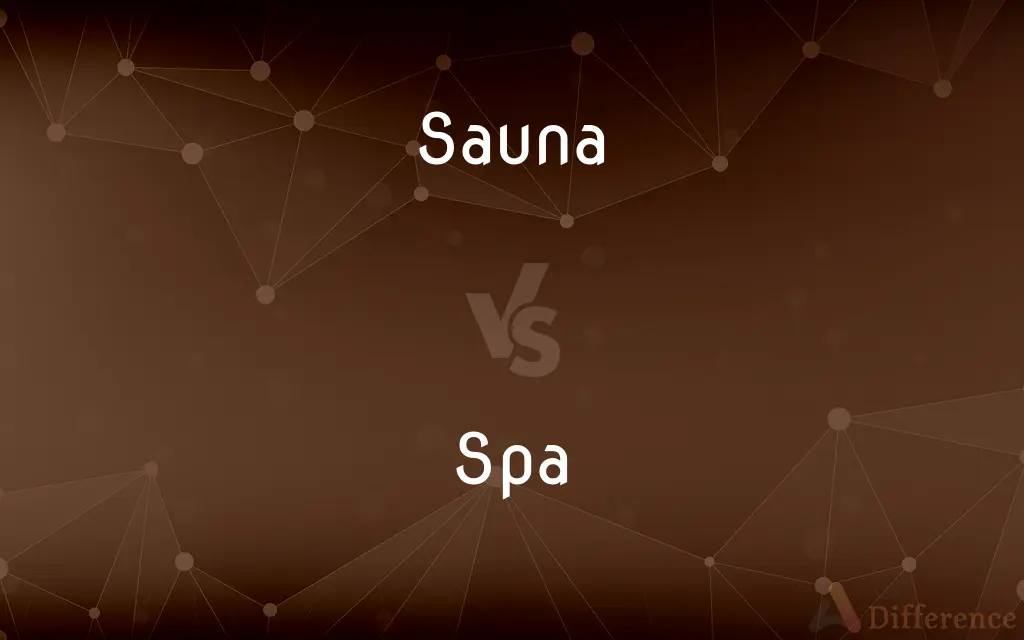Sauna vs. Spa — What's the Difference?
By Tayyaba Rehman & Urooj Arif — Updated on April 4, 2024
A sauna is a specific type of heat room used for relaxation and sweating, while a spa is a broad term for facilities offering health and relaxation treatments, possibly including saunas.

Difference Between Sauna and Spa
Table of Contents
ADVERTISEMENT
Key Differences
Saunas are small rooms or houses designed for experiencing dry or wet heat sessions, primarily aimed at promoting sweating and relaxation. Originating from Finland, saunas are known for their health benefits, including improved circulation and muscle relaxation. In contrast, a spa is a facility that offers a variety of services for health and relaxation, such as massages, facials, mud baths, and often includes amenities like saunas and steam rooms. Spas cater to a broader experience of wellness and beauty, integrating various treatments to enhance physical and mental well-being.
While saunas focus on the use of heat to cleanse and rejuvenate the body, spas encompass a wider range of treatments that may also focus on beauty, detoxification, and holistic health. Saunas are characterized by their simplicity and the specific health benefits of heat exposure, including relaxation of muscles, improvement of circulation, and aid in recovery after physical exercise. Spas, however, provide a more comprehensive approach to wellness, offering personalized treatments that can include sauna sessions but also extend to massages, hydrotherapy, skincare, and more.
The environment of a sauna is typically a wood-paneled room with benches, where temperatures can range from 70 to 100 degrees Celsius (158 to 212 degrees Fahrenheit). Users often pour water over heated rocks to generate steam. On the other hand, spas are usually luxurious settings that offer a tranquil environment for a variety of wellness treatments. They are designed to provide a complete relaxation and rejuvenation experience, often in a more elaborate and service-oriented environment compared to the straightforward setup of a sauna.
Saunas can be a standalone feature in homes, gyms, and public bathhouses, emphasizing the cultural and social aspects of sauna-going in some cultures. Conversely, spas are commercial establishments that combine physical treatments with a focus on overall well-being, relaxation, and luxury, often part of resorts, hotels, or dedicated wellness centers.
The choice between visiting a sauna or a spa depends on the individual’s wellness goals. If the primary desire is to enjoy the benefits of heat and steam in a simple setting, a sauna may suffice. However, for those seeking a broader spectrum of relaxation and health treatments in a more pampering environment, a spa offers a more versatile and comprehensive wellness experience.
ADVERTISEMENT
Comparison Chart
Definition
A room designed for dry or wet heat sessions.
A facility offering a variety of health and relaxation services.
Primary Purpose
To promote sweating and relaxation through heat exposure.
To provide a wide range of wellness treatments.
Treatments Offered
Limited to heat exposure sessions.
Includes massages, facials, hydrotherapy, sauna sessions, etc.
Environment
Wood-paneled room with benches and heated rocks.
Luxurious settings with various amenities for relaxation.
Health Benefits
Improves circulation, relaxes muscles, aids in recovery.
Broad spectrum of benefits depending on treatments chosen.
Usage
Typically part of a routine for wellness or social activity.
Often used for special occasions or holistic wellness regimes.
Cultural Origin
Finland
Various origins, depending on the treatment traditions.
Compare with Definitions
Sauna
Designed for promoting sweating.
The sauna is set at a high temperature for maximum sweating.
Spa
A facility for health and relaxation treatments.
The spa offers a wide range of massages and facials.
Sauna
Originated in Finland.
Saunas are an essential part of Finnish culture.
Spa
Offers treatments for beauty and health.
She booked a spa day for a detoxifying mud bath.
Sauna
A heat room for dry or wet sessions.
He visits the sauna weekly for muscle relaxation.
Spa
Includes various wellness services.
This spa is known for its hydrotherapy treatments.
Sauna
Used for relaxation and health.
Regular sauna sessions help in improving her circulation.
Spa
Often part of luxury resorts.
Their resort spa provides a tranquil environment for relaxation.
Sauna
Can be found in gyms and homes.
Their gym offers a sauna for post-workout recovery.
Spa
Provides a comprehensive wellness experience.
The spa experience includes access to saunas, steam rooms, and pools.
Sauna
A sauna (, Finnish: [ˈsɑu̯nɑ]), or sudatory, is a small room or building designed as a place to experience dry or wet heat sessions, or an establishment with one or more of these facilities. The steam and high heat make the bathers perspire.
Spa
A spa is a location where mineral-rich spring water (and sometimes seawater) is used to give medicinal baths. Spa towns or spa resorts (including hot springs resorts) typically offer various health treatments, which are also known as balneotherapy.
Sauna
A small room or structure that provides dry heat or steam for bathing or refreshing the body.
Spa
A resort providing therapeutic baths.
Sauna
A bath or period of time spent in a sauna.
Spa
A resort area having mineral springs.
Sauna
A room or a house designed for heat sessions.
The hotel has a sauna in the basement.
Spa
A fashionable hotel or resort.
Sauna
The act of using a sauna.
John had a sauna after his swim.
Joanne went for a sauna after her swim.
Spa
A health spa.
Sauna
A public sauna.
Spa
A tub for relaxation or invigoration, usually including a device for raising whirlpools in the water.
Sauna
A very hot place or room.
Spa
A health resort near a mineral spring or hot spring.
Sauna
To use a sauna.
Spa
A trendy or fashionable resort.
Sauna
A Finnish steam bath; steam is produced by pouring water over heated rocks
Spa
A health club.
They went to a spa for a massage.
Spa
A hot tub.
Their bath is fitted with a spa.
Spa
(dialect) A convenience store.
Spa
An idiot; a gobshite
Spa
A clumsy person (see spastic)
Spa
A spring or mineral water; - so called from a place of this name in Belgium.
Spa
A health resort near a spring or at the seaside
Spa
A fashionable hotel usually in a resort area
Spa
A place of business with equipment and facilities for exercising and improving physical fitness
Common Curiosities
Can a spa contain a sauna?
Yes, many spas include saunas among their range of wellness treatments.
Is a sauna visit a social activity?
In some cultures, especially in Finland, visiting a sauna is a significant social activity.
What types of treatments can you find at a spa?
Spas offer treatments like massages, facials, hydrotherapy, and sometimes sauna sessions.
Are saunas or spas better for relaxation?
Both can offer relaxation; the choice depends on whether you prefer the simplicity of a sauna or the comprehensive treatment options of a spa.
What are the health benefits of using a sauna?
Sauna use can improve circulation, relax muscles, and aid in recovery from physical activities.
Can visiting a spa have beauty benefits?
Yes, many spa treatments are designed for beauty benefits, including skincare, facials, and body treatments.
How often should you visit a sauna or spa?
Frequency depends on personal wellness goals, though moderate, regular visits are common for both for sustained benefits.
Can anyone use a sauna?
Most people can use a sauna, but it’s advised to consult a doctor first if you have health concerns.
What is the main difference between a sauna and a spa?
A sauna is specifically a heat room for sweating and relaxation, while a spa is a broader facility offering various health and relaxation treatments.
How do the environments of saunas and spas differ?
Saunas have a simple, wood-paneled environment focused on heat exposure, while spas offer luxurious settings for a variety of treatments.
Is there an age limit for sauna or spa usage?
Policies vary, but generally, there are age restrictions, especially for saunas, due to the intense heat.
What should you wear to a sauna or spa?
Sauna etiquette varies by culture; spas usually provide robes and slippers for use during your visit.
Are saunas safe for pregnant women?
Pregnant women are often advised to avoid saunas due to the high heat, but should always consult with a healthcare provider.
Can sauna use aid weight loss?
While sauna use promotes sweating and can temporarily reduce water weight, it should not be relied upon for significant weight loss.
What makes a spa experience luxurious?
The quality of treatments, the tranquility of the environment, and the level of personal service contribute to a luxurious spa experience.
Share Your Discovery

Previous Comparison
Arrange vs. Organize
Next Comparison
Puddle vs. WaterAuthor Spotlight
Written by
Tayyaba RehmanTayyaba Rehman is a distinguished writer, currently serving as a primary contributor to askdifference.com. As a researcher in semantics and etymology, Tayyaba's passion for the complexity of languages and their distinctions has found a perfect home on the platform. Tayyaba delves into the intricacies of language, distinguishing between commonly confused words and phrases, thereby providing clarity for readers worldwide.
Co-written by
Urooj ArifUrooj is a skilled content writer at Ask Difference, known for her exceptional ability to simplify complex topics into engaging and informative content. With a passion for research and a flair for clear, concise writing, she consistently delivers articles that resonate with our diverse audience.














































